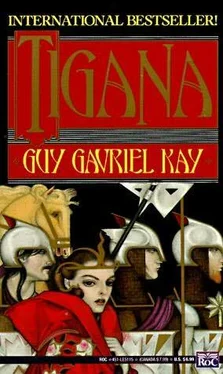Guy Kay - Tigana
Здесь есть возможность читать онлайн «Guy Kay - Tigana» — ознакомительный отрывок электронной книги совершенно бесплатно, а после прочтения отрывка купить полную версию. В некоторых случаях можно слушать аудио, скачать через торрент в формате fb2 и присутствует краткое содержание. Год выпуска: 1990, Жанр: Фэнтези, на английском языке. Описание произведения, (предисловие) а так же отзывы посетителей доступны на портале библиотеки ЛибКат.
- Название:Tigana
- Автор:
- Жанр:
- Год:1990
- ISBN:нет данных
- Рейтинг книги:4 / 5. Голосов: 1
-
Избранное:Добавить в избранное
- Отзывы:
-
Ваша оценка:
- 80
- 1
- 2
- 3
- 4
- 5
Tigana: краткое содержание, описание и аннотация
Предлагаем к чтению аннотацию, описание, краткое содержание или предисловие (зависит от того, что написал сам автор книги «Tigana»). Если вы не нашли необходимую информацию о книге — напишите в комментариях, мы постараемся отыскать её.
Tigana — читать онлайн ознакомительный отрывок
Ниже представлен текст книги, разбитый по страницам. Система сохранения места последней прочитанной страницы, позволяет с удобством читать онлайн бесплатно книгу «Tigana», без необходимости каждый раз заново искать на чём Вы остановились. Поставьте закладку, и сможете в любой момент перейти на страницу, на которой закончили чтение.
Интервал:
Закладка:
Which was bad, because with an audience the soldiers would now have to clearly establish their authority. What had been a game when done in private was something else now. Dianora wanted to turn away. She wanted her father back from the Deisa, she wanted Prince Valentin back and alive, her mother back from whatever country she wandered through.
She watched. To share it. To bear witness and remember, knowing even then that such things were going to matter, if anything mattered in the days and years to come.
The soldier with the drawn blade placed the tip of it very carefully against her brother's breast. The afternoon sunlight glinted from it. It was a working blade, a soldier's sword. There came a small sound from the people gathered around the edges of the square.
Her brother said, a little desperately, "They cannot hold the name. You know they cannot. You have destroyed us. Is it necessary to go on causing pain? Is it necessary?"
He is only fifteen, Dianora prayed, gripping the ledge like death, her hand a claw. He was too young to fight. He was not allowed. Forgive him this. Please.
The four Asolini traders, as one man, stepped quickly out of range. One of the soldiers, the one with the high laugh, shifted uncomfortably, as if regretting what this had come to. But there was a crowd gathered. The boy had had his fair chance. There was really no choice now.
The sword pushed delicately forward a short way and then withdrew. Through a torn blue tunic a welling of blood appeared and hung a moment, bright in the springtime light, as if yearning towards the blade, before it broke and slid downwards, staining the blue.
"The name," said the soldier quietly. There was no levity in his voice now. He was a professional, and he was preparing himself to kill, Dianora realized.
A witness, a memory, she saw her younger brother spread his feet then, as if to anchor himself in the ground of the square. She saw his hands clench into fists at his sides. She saw his head go back, lifting towards the sky.
And then she heard his cry.
He gave them what they demanded of him, he obeyed the command, but not sullenly or diffidently, and not in shame. Rooted in the land of his fathers, standing before the home of his family he looked towards the sun and let a name burst forth from his soul.
"Tigana!" he cried that all should hear. All of them, everyone in the square. And again, louder yet: "Tigana!" And then a third, a last time, at the very summit of his voice, with pride, with love, with a lasting, unredeemed defiance of the heart.
"TIGANA!"
Through the square that cry rang, along the streets, up to the windows where people watched, over the roofs of houses running westward to the sea or eastward to the temples, and far beyond all of these, a sound, a name, a hurled sorrow in the brightness of the air.
And though the four merchants could not cling to the name, though the soldiers could not hold it, the women at the windows and the children with them and the men riveted stone-still in street and square could hear it clearly, and clutch it to themselves, and they could gather and remember the pride at the base of that spiraling cry.
And that much, looking around, the soldiers could see plainly and understand. It was written in the faces gathered around them. He had done only what they themselves had ordered him to do, but the game had been turned inside out, it had turned out wrong in some way they could but dimly comprehend.
They beat him of course.
With their fists and feet and with the flats of their cared-for blades. Naddo too, for being there and so a part of it. The crowd did not disperse though, which would have been the usual thing when a beating took place. They watched in a silence unnatural for so many people. The only sound was that of the blows falling, for neither boy cried out and the soldiers did not speak.
When it was over they scattered the crowd with oaths and imprecations. Crowds were illegal, even though they themselves had caused this one to form. In a few moments everyone was gone. There were only faces behind half-drawn curtains at upstairs windows looking down on a square empty save for two boys lying in the settling dust, blood bright on their clothing in the clear light. There had been birds singing all around and all through what had happened. Dianora could remember.
She forced herself to remain where she was. Not to run down to them. To let them do this alone, as was their right. And at length she saw her brother rise with the slow, meditated movements of a very old man. She saw him speak to Naddo and then carefully help him to his feet. And then, as she had known would happen, she saw him, begrimed and bleeding and hobbling very badly, lead Naddo east without a backwards looks, towards the site where they were assigned to work that day.
She watched them go. Her eyes were dry. Only when the two of them turned the corner at the far end of the square and so were gone from sight did she leave her window. Only then did she loosen her white-clawed hold on the wood of the window-ledge. And only then, invisible to everyone with her curtains drawn, did she allow her tears to fall: in love, and for his hurts, and terrible pride.
When they came home that night she and the servant-woman heated water and drew baths for them and afterwards they dealt with the wounds and the black and purpling bruises as best they could.
Later, over dinner, Naddo told them he was leaving. That same night, he said. It was too much, he said, awkwardly twisting in his seat, speaking to Dianora, for her brother had turned his face away at Naddo's first announcement.
There was no life to be made here, Naddo said with passionate urgency through a torn and swollen mouth. Not with the viciousness of the soldiers and the even more vicious taxes. If a young man, a young man such as himself, was to have any hope of doing something with his life, Naddo said, he had to get away. Desperately his eyes besought her understanding. He kept glancing nervously over to where her brother had now fully turned his back on both of them.
Where will you go, Dianora had asked him.
Asoli, he'd told her. It was a hard, wet land, unbearably hot and humid in summer, everyone knew that. But there was room there for new blood. The Asolini made people welcome, he'd heard, more so than in the Barbadian lands to the east. He would never ever go to Corte or Chiara. People from Tigana did not go there, he said. Her brother made a small sound at that but did not turn; Naddo glanced over at him again and swallowed, his Adam's apple bobbing in his throat.
Three other young men had made plans, he said to Dianora. Plans to slip out from the city tonight and make their way north. He'd known about it for some time, he said. He hadn't been sure. He hadn't known what to do. What had happened this morning had made up his mind for him.
Eanna light your path, Dianora had said, meaning it. He had been a good apprentice and then a brave and loyal friend. People were leaving all the time. The province of Lower Corte was a bad place in a very bad time. Naddo's left eye was completely swollen shut. He might easily have been killed that afternoon.
Later, when he'd packed his few belongings and was ready to leave, she gave him some silver from her father's hidden store. She kissed him in farewell. He'd begun weeping then. He commended himself to her mother and opened the front door. On the threshold he'd turned back again, still crying.
"Goodbye," he'd said, in anguish, to the figure staring stonily into the fire on the front-room hearth. Seeing the look on Naddo's face Dianora silently willed her brother to turn around. He did not. Deliberately he knelt and laid another log on the fire.
Naddo stared at him a moment longer, then he turned to look at Dianora, failed to achieve a tremulous, tearful smile, and slipped out into the dark and away.
Читать дальшеИнтервал:
Закладка:
Похожие книги на «Tigana»
Представляем Вашему вниманию похожие книги на «Tigana» списком для выбора. Мы отобрали схожую по названию и смыслу литературу в надежде предоставить читателям больше вариантов отыскать новые, интересные, ещё непрочитанные произведения.
Обсуждение, отзывы о книге «Tigana» и просто собственные мнения читателей. Оставьте ваши комментарии, напишите, что Вы думаете о произведении, его смысле или главных героях. Укажите что конкретно понравилось, а что нет, и почему Вы так считаете.










